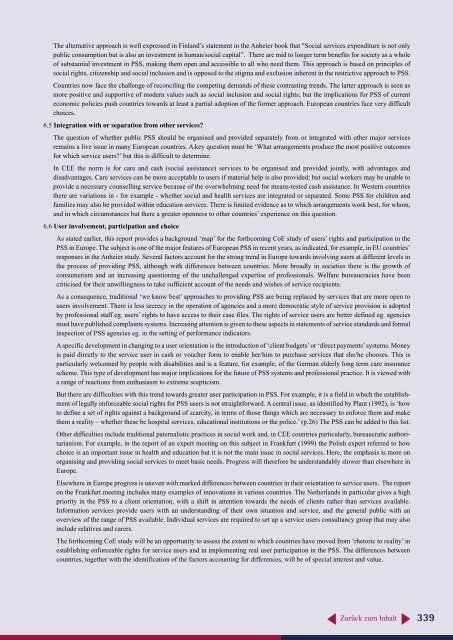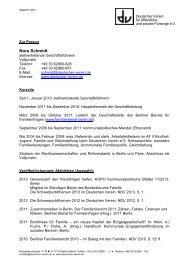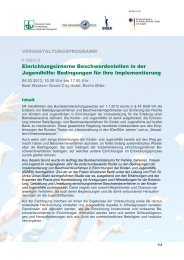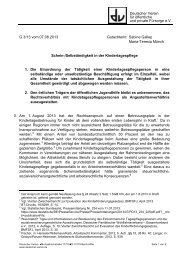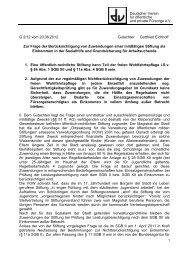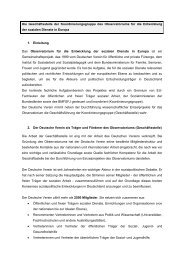Workshop 1.6 - Deutscher Verein für öffentliche und private Fürsorge
Workshop 1.6 - Deutscher Verein für öffentliche und private Fürsorge
Workshop 1.6 - Deutscher Verein für öffentliche und private Fürsorge
Erfolgreiche ePaper selbst erstellen
Machen Sie aus Ihren PDF Publikationen ein blätterbares Flipbook mit unserer einzigartigen Google optimierten e-Paper Software.
The alternative approach is well expressed in Finland’s statement in the Anheier book that "Social services expenditure is not only<br />
public consumption but is also an investment in human/social capital”. There are mid to longer term benefits for society as a whole<br />
of substantial investment in PSS, making them open and accessible to all who need them. This approach is based on principles of<br />
social rights, citizenship and social inclusion and is opposed to the stigma and exclusion inherent in the restrictive approach to PSS.<br />
Countries now face the challenge of reconciling the competing demands of these contrasting trends. The latter approach is seen as<br />
more positive and supportive of modern values such as social inclusion and social rights; but the implications for PSS of current<br />
economic policies push countries towards at least a partial adoption of the former approach. European countries face very difficult<br />
choices.<br />
6.5 Integration with or separation from other services?<br />
The question of whether public PSS should be organised and provided separately from or integrated with other major services<br />
remains a live issue in many European countries. A key question must be ‘What arrangements produce the most positive outcomes<br />
for which service users?’ but this is difficult to determine.<br />
In CEE the norm is for care and cash (social assistance) services to be organised and provided jointly, with advantages and<br />
disadvantages. Care services can be more acceptable to users if material help is also provided; but social workers may be unable to<br />
provide a necessary counselling service because of the overwhelming need for means-tested cash assistance. In Western countries<br />
there are variations in - for example - whether social and health services are integrated or separated. Some PSS for children and<br />
families may also be provided within education services. There is limited evidence as to which arrangements work best, for whom,<br />
and in which circumstances but there a greater openness to other countries’ experience on this question.<br />
6.6 User involvement, participation and choice<br />
As stated earlier, this report provides a backgro<strong>und</strong> ‘map’ for the forthcoming CoE study of users’ rights and participation in the<br />
PSS in Europe. The subject is one of the major features of European PSS in recent years, as indicated, for example, in EU countries’<br />
responses in the Anheier study. Several factors account for the strong trend in Europe towards involving users at different levels in<br />
the process of providing PSS, although with differences between countries. More broadly in societies there is the growth of<br />
consumerism and an increasing questioning of the unchallenged expertise of professionals. Welfare bureaucracies have been<br />
criticised for their unwillingness to take sufficient account of the needs and wishes of service recipients.<br />
As a consequence, traditional ‘we know best’ approaches to providing PSS are being replaced by services that are more open to<br />
users involvement. There is less secrecy in the operation of agencies and a more democratic style of service provision is adopted<br />
by professional staff eg. users’ rights to have access to their case files. The rights of service users are better defined eg. agencies<br />
must have published complaints systems. Increasing attention is given to these aspects in statements of service standards and formal<br />
inspection of PSS agencies eg. in the setting of performance indicators.<br />
A specific development in changing to a user orientation is the introduction of ‘client budgets’or ‘direct payments’systems. Money<br />
is paid directly to the service user in cash or voucher form to enable her/him to purchase services that she/he chooses. This is<br />
particularly welcomed by people with disabilities and is a feature, for example, of the German elderly long term care insurance<br />
scheme. This type of development has major implications for the future of PSS systems and professional practice. It is viewed with<br />
a range of reactions from enthusiasm to extreme scepticism.<br />
But there are difficulties with this trend towards greater user participation in PSS. For example, it is a field in which the establishment<br />
of legally enforceable social rights for PSS users is not straightforward. A central issue, as identified by Plant (1992), is ‘how<br />
to define a set of rights against a backgro<strong>und</strong> of scarcity, in terms of those things which are necessary to enforce them and make<br />
them a reality – whether these be hospital services, educational institutions or the police.’ (p.26) The PSS can be added to this list.<br />
Other difficulties include traditional paternalistic practices in social work and, in CEE countries particularly, bureaucratic authoritarianism.<br />
For example, in the report of an expert meeting on this subject in Frankfurt (1999) the Polish expert referred to how<br />
choice is an important issue in health and education but it is not the main issue in social services. Here, the emphasis is more on<br />
organising and providing social services to meet basic needs. Progress will therefore be <strong>und</strong>erstandably slower than elsewhere in<br />
Europe.<br />
Elsewhere in Europe progress is uneven with marked differences between countries in their orientation to service users. The report<br />
on the Frankfurt meeting includes many examples of innovations in various countries. The Netherlands in particular gives a high<br />
priority in the PSS to a client orientation, with a shift in attention towards the needs of clients rather than services available.<br />
Information services provide users with an <strong>und</strong>erstanding of their own situation and service, and the general public with an<br />
overview of the range of PSS available. Individual services are required to set up a service users consultancy group that may also<br />
include relatives and carers.<br />
The forthcoming CoE study will be an opportunity to assess the extent to which countries have moved from ‘rhetoric to reality’ in<br />
establishing enforceable rights for service users and in implementing real user participation in the PSS. The differences between<br />
countries, together with the identification of the factors accounting for differences, will be of special interest and value.<br />
Zurück zum Inhalt<br />
339


